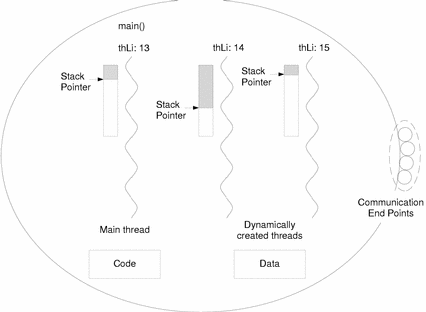Threads
This section provides an overview of the use of threads in the ChorusOS operating system. For further information regarding threads, thread handling, thread synchronization, thread scheduling, per-thread data, and threads and libraries, see the ChorusOS 5.0 Application Developer's Guide.
Within an actor, whether user or supervisor, one or more threads may execute concurrently. A thread is the unit of execution in a ChorusOS operating system and represents a single flow of sequential execution of a program. A thread is characterized by a context corresponding to the state of the processor (registers, program counter, stack pointer or privilege level, for example). See Figure 2-4.
Figure 2-4 A Multi-Threaded Actor

Threads can be created and deleted dynamically. A thread may be created in an actor other than the one to which the creator thread belongs, provided they are both running on the same machine. The actor in which the thread was created is called the home actor or the owning actor. The home actor of a thread is constant during the life of the thread.
The system assigns decreasing priorities to boot actor threads, so that boot actor main threads are started in the order in which they were loaded into the system image. If a boot actor's main thread sleeps or is blocked, the next boot actor threads will be scheduled for running.
Although there are no relationships maintained by the ChorusOS operating system between the creator thread and the created thread, the creator thread is commonly called the parent thread, and the created thread is commonly called the child thread.
A thread is named by a local identifier referred to as a thread identifier. The scope of this type of identifier is the home actor. In order to name a thread of another actor, you must provide the actor capability and the thread identifier. It is possible for a thread to refer to itself by using the predefined constant: K_MYSELF.
All threads belonging to the same home actor share all the resources of that actor. In particular, they may access its memory regions, such as the code and data regions, freely. In order to facilitate this access, the ChorusOS operating system provides synchronization tools, covered in "Synchronization" in this book.
Threads are scheduled by the microkernel as independent entities The scheduling policy used depends on the scheduling module configured within the system. In a first approach, assume that a thread may be either active or waiting. A waiting thread is blocked until the arrival of an event. An active thread may be running or ready to run.
- © 2010, Oracle Corporation and/or its affiliates
